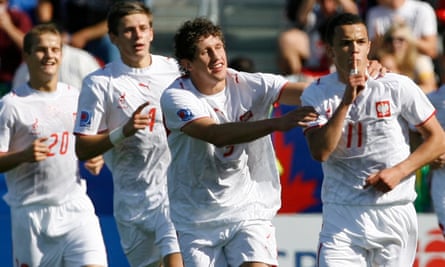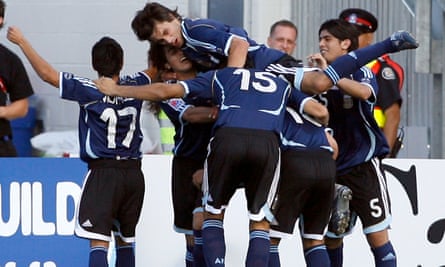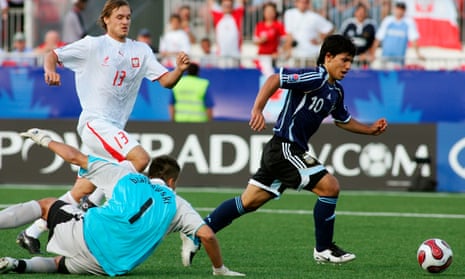You can be forgiven for pleading ignorance if you have never heard of Sandecja Nowy Sacz, even if they have just returned to Poland’s top division as champions. They are an unremarkable club from a small city in southern Poland, play in a ramshackle little stadium and rank a run to the last eight of the Polish Cup in 2014 as one of their finest achievements. All of which explains the schadenfreude at Freddy Adu’s expense when he was linked with a move to Sandecja earlier this year. Where, people wondered, did it all go so wrong for the USA’s former golden boy?
Despite the rare attention for Sandecja, the suggestion that they were on the verge of signing Adu turned out to be fake news. There was no agreement with the former teenage prodigy who had come nowhere near matching the hype caused by his high rating in Football Manager, a nomadic player who can now be filed alongside Cherno Samba, Keirrison and Tonton Zola Moukoko. Real life is much less forgiving. Sandecja dismissed the rumours, the world kept spinning and Adu’s search for a club went on.
Such an inconsequential non-story would normally end there. Yet in a manner befitting a quirky, meandering career that has featured spells in Brazil, Finland, Greece, Portugal, Serbia and Turkey, Adu does have an unwitting attachment with a part of Sandecja’s past that goes beyond transfer gossip. The bond is not obvious at first glance, perhaps even a little tenuous, the kind of coincidence that emerges when you scrabble around the internet looking for information about a young Polish striker who had the world at his feet 10 years ago.
Robert who?
“Wow!” Dawid Janczyk said, barely able to comprehend how highly he was valued by one of Europe’s top clubs. “Over €4m. I can’t believe it.” This was a lot to take in for the boy from Nowy Sacz. It was the summer of 2007 and Janczyk’s outstanding performances for Poland in the Under-20 World Cup in Canada were enhancing his reputation as one of the most gifted young players in Europe.
His coaches raved about his skill and finishing, Liverpool and Tottenham were among the clubs who were keeping tabs on him and there were links with a move to Serie A, but in the end it was CSKA Moscow who won his signature, paying Legia Warsaw €4.2m for the 19-year-old. It was a Polish record, beating the €3.7m that Borussia Dortmund spent on Wisla Krakow’s Jakub Blaszczykowski earlier that year.
From CSKA’s perspective, Janczyk was worth the money. His potential was obvious. He had started his career at Sandejca, his hometown club, and word of the youngster’s talent spread quickly, his stock rising even higher when Chelsea, the champions of England, gave him a trial in 2005. Janczyk left London without a deal, but the future was still bright and Legia signed him for €6,000.
Janczyk continued to develop rapidly in the Polish capital, helping his new team win the league in his first season and scoring a hat-trick against Belgium at the Under-19 European Championship in 2006. He was regarded as Legia’s brightest prospect even though a young striker called Robert Lewandowski was earning rave reviews in the reserves. Lewandowski, a year younger than Janczyk, found his opportunities limited and his progress stalled when he suffered a bad knee injury. He would not go to the U20 World Cup, his next club would be Znicz Pruszkow and it would be a while before he met Jürgen Klopp.
The rise of Janczyk, meanwhile, looked unstoppable, and Poland’s hopes of success in Canada largely rested on his shoulders. They were drawn in a group with Brazil, South Korea and the USA, with a fine solo goal from Janczyk against the Koreans helping Poland reach the last 16, where their opponents in Toronto were an Argentina side containing Sergio Agüero, Éver Banega and Ángel di María.

Argentina had emerged from their group unbeaten, their defence impenetrable and their attack unstoppable, and it came as a shock they fell behind to an opportunistic strike from Janczyk in the 33rd minute. It was his third goal of the tournament and the first time anyone had found a way past Romero in four matches. CSKA’s scouts nodded approvingly. Janczyk, not Lewandowski, was the name on everyone’s lips in Poland. He was the hotshot striker destined for the top and nothing was going to stand in his way. Nothing, that is, apart from a struggle to cope with premature fame and a troubled relationship with alcohol.
While Janczyk’s first year in Russia ended with him crashing the decisive penalty high into the net when CSKA beat Amkar Perm in the Russian Cup final, he was the forgotten man by the time he left Moscow in 2013, a cautionary tale about young players failing to live up to early potential. He was left out of Poland’s Euro 2008 squad. He went out on loan to four different clubs, with the standard of football in which he was involved dropping each time.
Janczyk left coaches unimpressed with his attitude and eventually returned to Sandecja in 2016, the local hero back where it all started – but much sooner than he must have imagined. His career had promised so much and produced so little. It felt inevitable when even that romantic homecoming turned sour and Sandecja decided not to renew Janczyk’s contract at the start of 2017.
“Janczyk was the big star,” Ben Starosta, who played alongside him in 2007, told Ekstraklasa magazine in 2012. “But sometimes things don’t turn out how they are supposed to.”
A lost decade
Ten years on from that World Cup, it is clear to see how difficult it can be for feted youngsters to fulfil their potential, how fine the margins are, how easy it is to squander talent or overestimate it. Take Brazil. They had David Luiz, Luiz Adriano, Marcelo, Willian and Jô, but their star was Alexandre Pato, a 17-year-old sensation who was about to join Milan. He was supposed to take the world by storm. He wasn’t supposed to be playing for Tianjin Quanjian in the Chinese Super League at the age of 27.
Mexico’s Giovanni dos Santos, then of Barcelona, once of Ipswich Town and now of LA Galaxy, was one of the players of the tournament. Expectations can be unrealistic at times, although some players have more than matched them. Spain had Gerard Piqué and Juan Mata, Chile had Alexis Sànchez and Arturo Vidal. Uruguay’s attack featured Edinson Cavani and Luis Suàrez. And Argentina, the champions, they had Agüero.
As for Poland, they weren’t all about Janczyk. They were handed the daunting task of taking on Brazil in Montreal in the tournament’s opening match, but defied the odds when they fought their way to a 1-0 victory, digging in after losing Krzysztof Krol to a second yellow card in the 27th minute. Grzegorz Krychowiak, whose outstanding performances in central midfield for Sevilla led to a move to PSG in 2016, had scored the winner four minutes before Krol’s dismissal, bending a magnificent free-kick past Cassio.
“We hadn’t beaten a Brazilian side for 33 years, not since the 1974 World Cup, when Grzegorz Lato scored,” Poland’s coach, Michal Globisz, said. “And tonight it was another Grzegorz who got the winner.”
Yet the strain of playing with 10 men for more than an hour against Brazil depleted Poland’s energy, and they paid for it when they lost 6-1 to the USA in their next match. Although Janczyk gave them the lead with a smart finish after five minutes, it was Adu who stole the show, scoring a hat-trick despite Adam Danch’s attempts to stay close to him. “He simply didn’t have the strength to cope,” Globisz said.
With Michael Bradley in midfield, the Americans were emerging as a force and they sealed first place in Group D by beating the disappointing Brazilians in their third match. Again Adu was influential, creating two goals for Jozy Altidore in a 2-1 win, performing with a strength and inventiveness that suggested the feverish hype surrounding him was justified.
That victory earned the USA a last-16 match against Uruguay and although they went behind to a late goal from Suárez, they battled back to win 2-1 in extra-time and set up a quarter-final with Austria. They would go no further, losing 2-1 despite Altidore scoring his fourth goal of the tournament, but reputations had been enhanced. Two weeks after the defeat to Austria, Adu joined Benfica from Real Salt Lake. Sandecja would have been glad to have him then.
Adu and Janczyk were both moving up in the world and when the latter beat two South Korean defenders before offering a demonstration of his composure in front of goal, Poland had the draw they needed to reach the last 16. “There are no more favourites when you get to this stage of the tournament,” Janczyk said. “I think that Brazil and Argentina have the same qualities and play a similar brand of football. We took a lot out of our win over Brazil and I think that we’ve got every chance of beating Argentina.”
Yet Janczyk’s bold words had to be placed into context. After drawing 0-0 with the Czech Republic in their opener, Argentina came alive in their next match, a 6-0 destruction of Panama, before Agüero scored the only goal against North Korea. “It’s just great to watch the boys up front sometimes,” Sergio Romero, their goalkeeper, said. “You even feel like applauding them.”
Agüero, 19, had spent a year at Atlético Madrid. Di María was on his way to Benfica. Other prospects such as Maxi Moralez, Pablo Piatti and Mauro Zárate were causing a stir and Argentina were strong favourites against Poland. But after 33 minutes, Janczyk’s optimism no longer looked quite so misguided. Drifting into space and collecting a pass on the right of the area, he gave his markers no chance to close him down, shooting hard, low and early, fizzing the ball past Romero and into the bottom right corner.
Poland were in pinch-yourself territory. Not for long, though. Argentina’s response was resounding. Seven minutes later, they sliced Poland open on the left and Di María bundled in the equaliser from close range.
The mood changed. Agüero had been quiet in the first half. A minute after the interval, he took charge. The threat looked containable when he received a pass just inside Poland’s area. Make the right choices, stay calm and Poland could keep the situation under control. No false moves, no rash decisions, no impetuosity and Agüero could be ushered away from danger.
He had his back to goal and his first touch was poor, the ball squirting off his foot and into the air. But the next sequence of play took the breath away. A little shimmy, the slightest of movements, tempted a defender forward, luring him into making a challenge, deceptively throwing him off balance. He lunged for the ball with his right foot, but Agüero saw him coming, lobbed him, turned and waited for the ball to drop. When it did, he slammed home a left-footed volley. What could Poland possibly have done to stop him? They were prepared for anything but that.
Here was a demonstration of true class in all its glory and Agüero settled the game with four minutes left, rounding Bartosz Bialkowski and tapping into the empty net after a defensive error. Agüero’s sixth goal of the tournament came in the 2-1 win over the Czechs in the final, his equaliser putting Argentina on course to win the U-20 World Cup for a record sixth time.

Aguero dominated in Canada, but at least Janczyk was on his way to Moscow. In 2009, however, he was still to make a meaningful impact at CSKA. Concerned about his attitude, worried that he had received too much too soon, he was loaned to Lokeren in Belgium. He fared well, scoring 14 times, but problems developed when he was loaned to Germinal Beerschot a year later.
He did not see eye to eye with the coach, Glen de Boeck, who wanted him to work harder in training. He was accused of being overweight. He endorsed a brand of wine. There were rumours that he was suffering from alcoholism. His decline was irreversible. Globisz said that he was supposed to be the next Wlodzimierz Lubanski. “It is unbelievable what happened to him,” he said. “I remember how Leo Beenhakker and Lubanski raved about his skills.”
Shortly after seeing his comeback at Sandecja cut short, Janczyk gave an interview in which he said that his drinking was under control, and that he had spent New Year’s Eve sober for the first time in seven years. It still wasn’t enough. Just as Sandecja didn’t want Adu, they also had no room for Janczyk, no space in the budget for sentiment. It’s not how football works. “If only someone would give me a chance,” he said. “It will prove that I can still play good football.”
There was a time when he played on the same pitch as Agüero and looked like he belonged. There is no pleasure in knowing that ship sailed long ago.

Comments (…)
Sign in or create your Guardian account to join the discussion